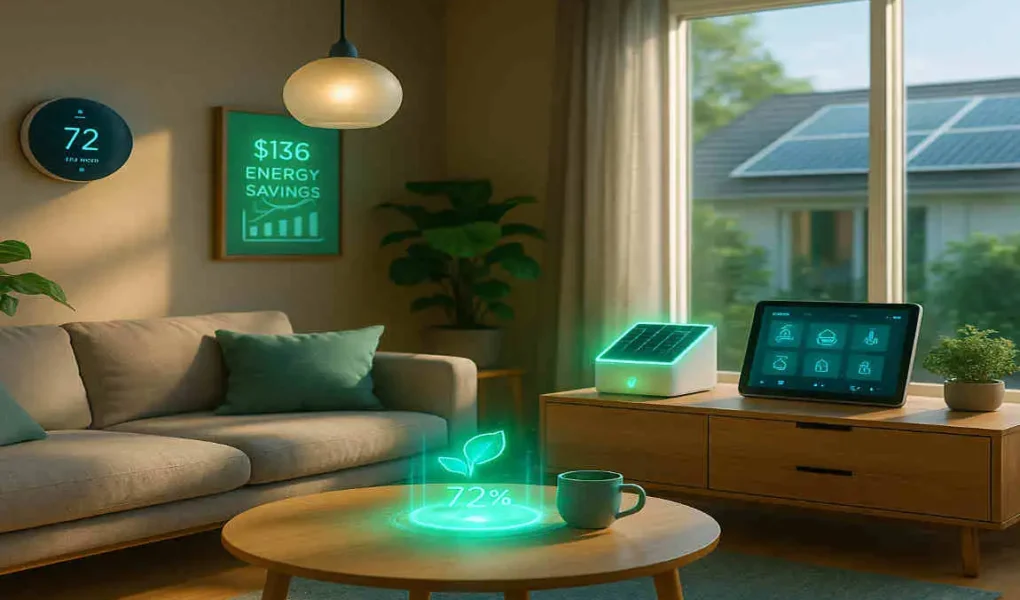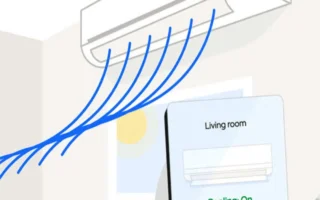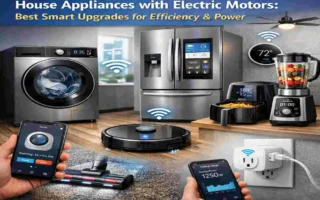In today’s fast-paced world, we all crave comfort in our homes. But what if we told you that you can achieve that comfort while also saving energy? It’s true! With the rise of innovative, energy-efficient appliances, it’s easier than ever to create a cozy, eco-friendly living space.
Understanding Appliance Roles in Home Comfort and Energy Savings
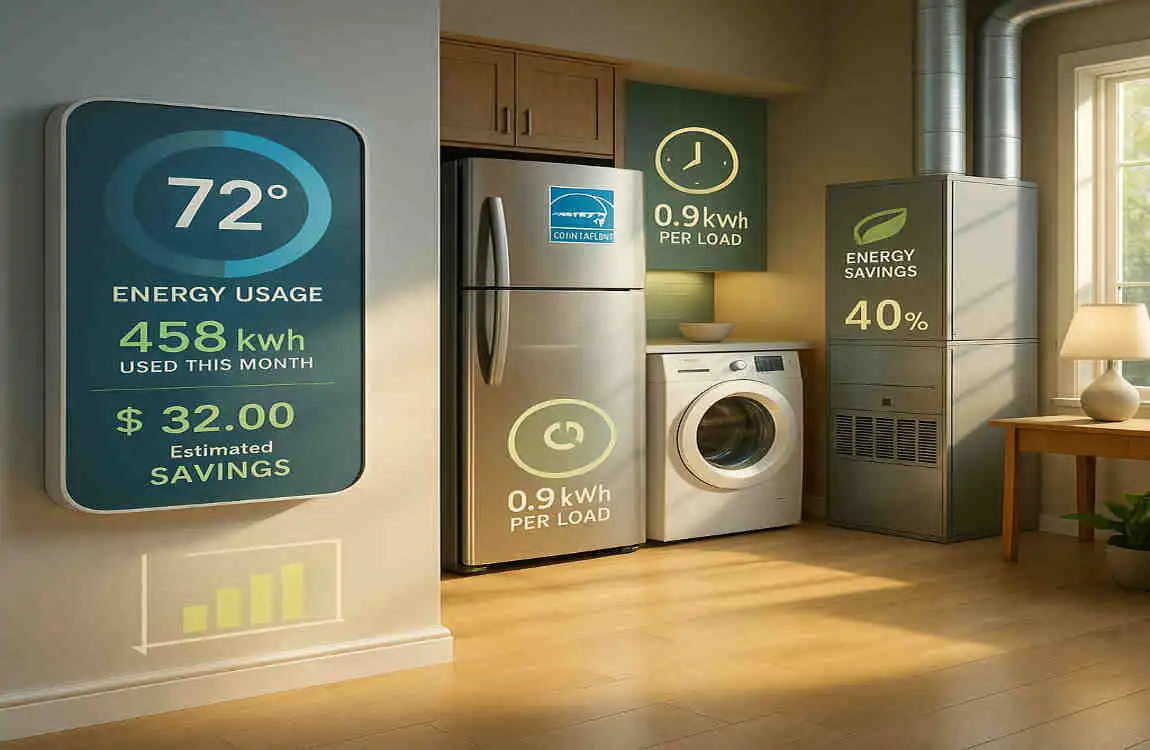
What is Home Comfort and Energy Efficiency?
Home comfort is all about creating a warm, inviting, and relaxing space that meets your needs. It’s the feeling of coziness you get when you walk through your front door after a long day. On the other hand, energy efficiency is about using resources wisely and minimizing waste. When you combine these two concepts, you get the perfect recipe for a sustainable and comfortable home.
Traditional vs. Innovative Appliances
Gone are the days of clunky, inefficient appliances that guzzle energy. Today, we have a wide range of innovative appliances designed to save energy while delivering top-notch performance. These smart devices use advanced technology to optimize their operations and reduce their environmental impact.
The Connection Between Appliance Usage and Energy Bills
Did you know that your appliances account for a significant portion of your energy consumption? From your refrigerator to your washing machine, these devices are constantly working to make your life easier. However, if you’re not using them efficiently, you could be throwing money out the window. Understanding how your appliances affect your energy bills can help you reduce consumption and save money.
Why Smart and Energy-Efficient Appliances Matter
Innovative and energy-efficient appliances are the future of home comfort. These devices use cutting-edge technology to optimize performance and minimize energy consumption. By investing in these appliances, you’re not only improving your home comfort but also reducing your carbon footprint and saving money on your energy bills.
Key Appliance Categories for Comfort and Energy
When it comes to home comfort and energy savings, specific appliance categories stand out. These include:
- HVAC (Heating, Ventilation, and Air Conditioning) systems
- Kitchen appliances
- Laundry appliances
- Lighting systems
In the following sections, we’ll explore how these appliances can help boost your comfort and save energy.
Smart Climate Control Appliances for Enhanced Comfort and Efficiency
How Can Houses Use Appliances Like Smart Thermostats and HVAC Systems?
Smart thermostats and HVAC systems are game-changers for regulating your home’s temperature. These devices use advanced sensors and algorithms to learn your preferences and optimize your comfort.
Features of Smart Thermostats
- Learning Schedules: Smart thermostats can learn your daily routine and adjust the temperature accordingly. This means you’ll never have to come home to a cold house again!
- Remote Control: With a smart thermostat, you can control your home’s temperature from anywhere using your smartphone. No more rushing home to turn on the heat!
- Zone Control: Some smart thermostats let you set different temperature zones in your home. This means you can keep your bedroom cool while keeping the rest of the house warm.
Energy-Saving Benefits
By using a smart thermostat and HVAC system, you can save up to 30% on your energy bills. These devices optimize your home’s temperature based on your preferences and the weather, ensuring you never waste energy.
Smart Fans and Air Purifiers
In addition to smart thermostats and HVAC systems, smart fans and air purifiers can also enhance your home comfort. These devices use advanced sensors to monitor your indoor air quality and adjust their operation accordingly.
Integrating Smart Sensors for Humidity and Temperature
To take your home comfort to the next level, consider integrating smart sensors for humidity and temperature. These devices can communicate with your smart appliances to keep your home at the perfect temperature and humidity.
Tips for Getting the Best Out of Climate Control Appliances
- Set a Schedule: Use your smart thermostat to create a schedule that aligns with your daily routine. This will ensure that your home is always at the perfect temperature.
- Use Zone Control: If your smart thermostat supports zone control, use it to create different temperature zones in your home. This will help you save energy and stay comfortable.
- Monitor Your Energy Use: Use the energy-monitoring features of your smart appliances to track your consumption and identify energy-saving opportunities.
Kitchen Appliances That Boost Comfort and Cut Energy Use
How Smart Refrigerators, Ovens, and Dishwashers Contribute to Comfort and Energy Efficiency
Your kitchen is the heart of your home, and your appliances play a crucial role in keeping it comfortable and efficient. Smart refrigerators, ovens, and dishwashers are designed to optimize their performance while minimizing their energy use.
Features of Smart Kitchen Appliances
- Adaptive Cooling: Smart refrigerators use adaptive cooling technology to maintain optimal temperature and humidity. This means your food will stay fresh longer, and you’ll save energy in the process.
- Self-Cleaning: Many smart ovens and dishwashers feature self-cleaning options that make maintenance a breeze. This not only saves you time but also ensures your appliances continue to operate at peak efficiency.
- Energy Saver Modes: Smart kitchen appliances often include energy-saving modes that reduce power consumption during off-peak hours. Using these modes can help you save money on your energy bills.
Innovative Induction Cooktops and Pressure Cookers
Induction cooktops and pressure cookers are two innovative appliances that can save you time and energy in the kitchen. Induction cooktops use electromagnetic energy to heat your pots and pans, while pressure cookers use steam to cook your food quickly and efficiently.
Innovative Coffee Makers and Small Appliances
Even your small appliances can contribute to your home comfort and energy savings. Innovative coffee makers, for example, can be programmed to brew your favorite beverage at the perfect time, ensuring that you never have to wait for your morning cup of joe.
Energy-Efficient Habits When Using Kitchen Appliances
- Use the right-sized pots and Pans: When using your induction cooktop, make sure to use pots and pans that match the size of the burner. This will help you save energy and cook more efficiently.
- Cook in Batches: When using your pressure cooker, try to cook in batches to save time and energy. This will also help you reduce your overall energy consumption.
- Use Energy Saver Modes: Take advantage of the energy-saving modes on your smart kitchen appliances to reduce power consumption during off-peak hours.
The Role of Appliance Maintenance in Boosting Performance and Saving Energy
Regular maintenance is key to keeping your kitchen appliances operating at peak efficiency. By keeping your appliances clean and well-maintained, you can extend their lifespan and save money on energy bills.
Laundry Appliances Innovating Comfort and Energy Management
Modern Washing Machines and Dryers with Sensor Technology
Your laundry appliances can also help boost your home’s comfort and save energy. Modern washing machines and dryers use sensor technology to optimize their performance and reduce their water and energy consumption.
How Can Houses Use Smart-Enabled Appliances for Customized Washing Cycles?
Intelligent washing machines and dryers can be programmed to create customized washing cycles that meet your specific needs. This means you can save time and energy while still getting clean, fresh laundry.
Heat Pump Dryers and Eco Mode Benefits
Heat pump dryers are an innovative solution for efficiently drying your clothes. These appliances use heat pump technology to recycle the heat from the drying process, reducing their energy consumption by up to 50%. Additionally, many modern dryers come with eco modes that further reduce their energy use.
The Importance of Timing Laundry Cycles to Off-Peak Energy Hours
To maximize your energy savings, consider timing your laundry cycles to off-peak energy hours. This means running your washing machine and dryer when energy demand is low, helping you save money on your energy bills.
Energy and Comfort Benefits of Appliance Automation
Appliance automation can take your home comfort and energy savings to the next level. By using smart apps and notifications, you can receive alerts when your laundry is done, and even start your appliances remotely.
Lighting and Entertainment Appliances for Comfort and Energy Control
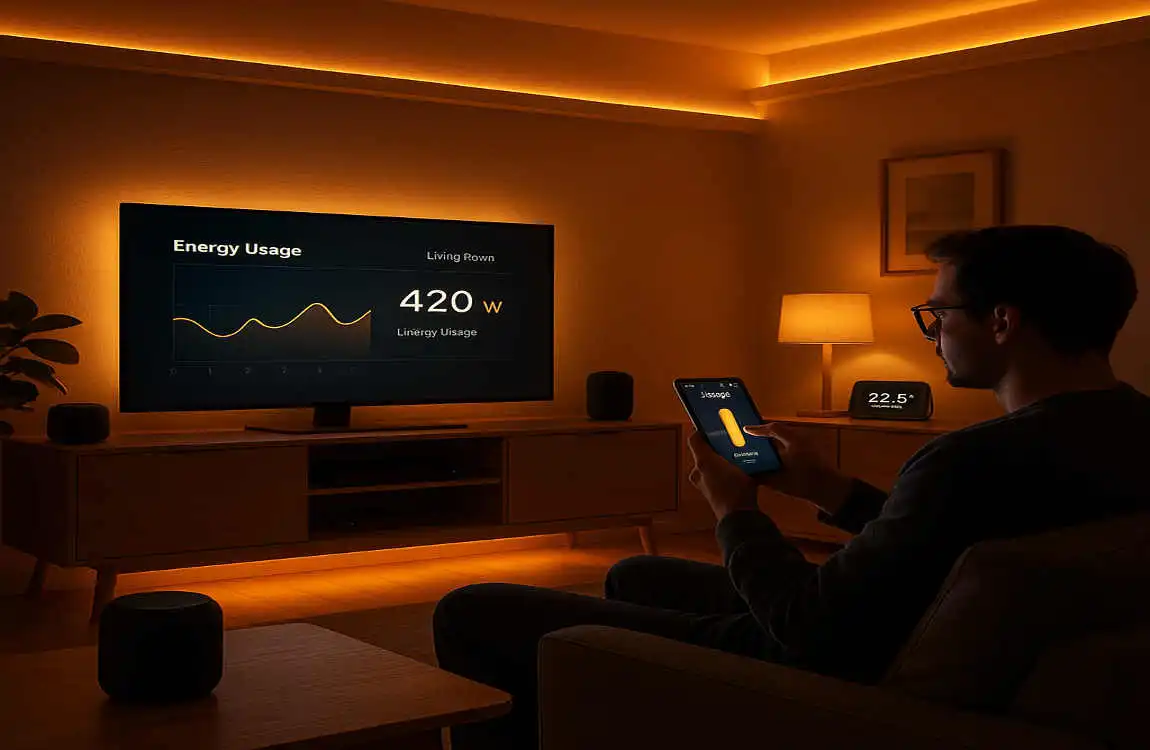
Smart Lighting Systems
Intelligent lighting systems are a great way to enhance your home comfort while saving energy. These systems use advanced technology to adjust the color and intensity of your lights based on your preferences and the time of day.
Features of Smart Lighting Systems
- Color Adjustment: Smart lighting systems can change the color of your lights to create the perfect ambiance for any occasion.
- Dimming: With an intelligent lighting system, you can easily adjust your lights to create a cozy, relaxing atmosphere.
- Motion Sensors: Many innovative lighting systems include motion sensors that turn off the lights when no one is in the room. This can help you save energy and reduce your carbon footprint.
Entertainment Appliances with Energy-Saving Modes
Your entertainment appliances, such as smart TVs and sound systems, can also enhance your home comfort and help you save energy. Many of these devices include energy-saving modes that reduce power consumption when not in use.
Integration with Home Automation Platforms
To maximize the benefits of your bright lighting and entertainment appliances, consider integrating them with a home automation platform. This will let you control all your devices from a single app, making it easy to optimize your home comfort and energy savings.
Practical Tips for Using Smart Plugs and Timers
- Use Smart Plugs: Smart plugs can help you save energy by turning off your appliances when not in use. Plug your device into a smart plug and set a schedule for when you want it to turn off.
- Set Timers: Many innovative lighting systems and entertainment appliances include timers that let you schedule when they turn on and off. This can help you save energy and reduce your carbon footprint.
Integrating Appliances with Home Automation for Maximum Benefits
Importance of Connecting Appliances via Smart Home Hubs or Apps
To get the most out of your smart appliances, it’s essential to connect them to a smart home hub or app. This will let you control all your devices from a single interface, making it easy to optimize your home comfort and energy savings.
Energy Monitoring and Usage Analytics
Many smart home hubs and apps include energy monitoring and usage analytics. These tools can help you track your energy consumption and identify areas where you can save. By understanding your energy use, you can make informed decisions about how to optimize your appliances for maximum efficiency.
Examples of Automation Rules for Comfort and Energy Savings
- Turn Off Appliances When No One Is Home: Set up an automation rule to turn off your appliances when no one is home. This can help you save energy and reduce your carbon footprint.
- Adjust Temperature Based on Weather: Use your smart thermostat to adjust your home’s temperature based on the weather outside. This will help you stay comfortable while saving energy.
- Turn On Lights at Sunset: Set up an automation rule to turn on your lights at sunset. This will help you save energy by ensuring that your lights are only on when needed.
Voice Control and Remote Management
Many smart home hubs and apps come with voice control and remote management features. This means you can control your appliances using your voice or from anywhere using your smartphone. This can help you save energy by ensuring that your devices are only on when needed.
Future Trends in Appliance Integration and Home Comfort Technology
The future of appliance integration and home comfort technology is exciting. We can expect to see even more advanced features and capabilities in the coming years, such as AI-powered optimization and predictive maintenance. By staying up to date with the latest trends, you can ensure your home is always at the forefront of comfort and efficiency.
Energy-Saving Tips and Best Practices for Using Home Appliances
Daily Habits That Enhance Energy Savings
- Turn Off Appliances When Not in Use: Make it a habit to turn off your appliances when not in use. This can help you save energy and reduce your carbon footprint.
- Use Energy-Saver Modes: Take advantage of the energy-saver modes on your smart appliances to reduce their power consumption during off-peak hours.
- Maintain Your Appliances: Regular maintenance is key to keeping them operating at peak efficiency. By keeping your devices clean and well-maintained, you can extend their lifespan and save money on energy bills.
Scheduling and Maintenance for Optimal Performance
- Create a Schedule: Use your smart appliances to create a schedule that aligns with your daily routine. This will help you save energy and stay comfortable.
- Perform Regular Maintenance: Regular maintenance is essential for keeping your appliances running smoothly. Make sure to clean your devices regularly and follow the manufacturer’s recommended maintenance schedule.
How Appliance Choices Impact Overall Home Energy Footprint
The appliances you choose can significantly impact your home’s overall energy footprint. By selecting energy-efficient models, you can reduce your consumption and save money on your energy bills.
Recommendations on Selecting Energy-Efficient Models
- Look for Energy Star Certification: When shopping for new appliances, look for the Energy Star certification. This means that the device meets strict energy-efficiency guidelines set by the U.S. Environmental Protection Agency.
- Compare Energy Consumption: When comparing models, ensure you compare their energy consumption. This will help you choose the most efficient option for your needs.
- Consider the Long-Term Savings: While energy-efficient appliances may have a higher upfront cost, they can save you money in the long run by reducing your energy consumption.

